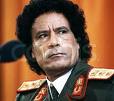Intelligence Partnership between Qadhafi and the CIA on counter-terrorism

Moussa Koussa, former Libyan intelligence chief, now foreign minister.Not very long ago, in 2009, the Central Intelligence Agency (CIA) came to an agreement with Libyan leader Colonel Qadhafi’s intelligence apparatus to offer counter-terrorism training to Libyan security personnel.
This arrangement and the build-up of close collaboration between the Libyan and American intelligence agencies was the result of the October 2001 visit to London by Assistant U.S. Secretary of State William J. Burns to confer with Moussa Koussa the chief of Libyan intelligence. Mr. Koussa is currently the foreign minister of the Qadhafi regime.
He provided the CIA with the names of the Libyan Islamic Fighting Group (LIFG) operatives and the Libyan Islamists who trained in Afghanistan, as well as dossiers of LIFG leaders living in Britain. Analysts describe the knowledge gained by the CIA provided by Moussa Koussa extremely valuable, and in the light of the central role of Libyan Afghans in al-Qaeda, this was a major intelligence windfall for the Bush administration.
By that time the LIFG had waged a violent insurgency against Colonel Qadhafi, and the American administration and the CIA knew the movement’s rapport and connection with the al-Qaeda. This domestic challenge drew Qadhafi toward the United States, and the U.S. since 9/11 had undertaken the War on Global Terrorism.
It is after the Burns-Koussa meeting in October 2001 that the U.S. administration designated the LIFG a foreign terrorist organization (FTO).
In fact, in 1998 Libya became the first country to issue an Interpol arrest warrant for Osama bin-Laden, charging that al-Qaeda had collaborated with domestic radicals in the 1994 killing of two German anti-terrorism agents in Libya.
The former Libyan intelligence chief and presently Libya’s foreign minister Moussa Koussa in no stranger to the United States: He earned a digree in sociology from Michigan State University in 1978, had written a political biography of Colonel Qadhafi for his master’s thesis. The following year he was posted to London as the head of the Libyan mission.
Colonel Qadhafi’s decision to renounce its nuclear program was negotiated by Koussa that brought Libya closer to the United States. In addition to turning over 55,000 pounds of nuclear equipment, Libya gave the CIA files with names of black-market suppliers, front companies and transporters.
Kenneth Katzman, a terrorism analyst attached to the Congressional Research service which is the independent research arm of the U.S. Congress, commented at that time “The information they turned over helped us to track down aspects of the black-market network and contributed to the shutdown of parts of that network in Malaysia and the United Arab Emirates.”
Despite the U.S. State Department’s 2009 human rights report on Libya gave a very grim picture of its human rights practices including disappearance and torture, a classified diplomatic cable released by the whistleblower web site WikiLeaks called Colonel Qadhafi’s Libyan government a “strong partner in the war against terrorism” and declared the relationship with Libya’s intelligence agency “excellent.”
George J. Tenet who was the director of the CIA in the Bush administration in his 2007 autobiography cited the easing of tensions with Libya as one of the major successes of his tenure, as it led to cooperation between the two spy services against al-Qaeda.
In its overall effort to combat Islamic terrorist network worldwide, the Bush administration, starting from the infamous Burns-Koussa meeting in London in October 2001 very steadily built an intelligence alliance with the Libyan leader Colonel Qadhafi. This strong and close cooperation built over the years made Qadhafi to help the United States pursue al-Qaeda network in North Africa by turning radicals over to neighboring pro-Western governments. He also provided information to the CIA on Libyan nationals with alleged ties to international terrorists.
The CIA-Qadhafi spy agency working relationship was so close the U.S. handed over to Libya some anti-Qadhafi Libyans captured in its campaign against terrorism. The relationship was so rosy, the Americans allowed Libyan agents to visit Guantanamo Bay detention facility in Cuba to interrogate Libyan detainees.
Colonel Qadhafi was one of the initial heads of state to denounce the September 11, 2001 attack on America.
In April 2004President Bush declared that “Libya has turned its back on terror.”
Two months later, Assistant Secretary of State Burns and J. Cofer Black, then-U.S. coordinator for counter-terrorism, traveled to Libya and met with Colonel Qadhafi.
During the visit, the U.S. formally reestablished direct diplomatic ties with Libya.
In September that year, the administration lifted sanctions barring most U.S. trade with Libya.
Four months later, U.S. oil firms won lucrative rights in Libya, beating out European competitors. Pentagon officials say that if relations continue to improve, the U.S. would like to include Libya in a proposed $500-million program along with nine other countries that would be aimed at countering Al Qaeda in the region.
The chronology of events is as follows:
1998: Libya becomes the first country to issue an international arrest warrant for Osama bin Laden.
1999: Qadhafi surrenders the two suspects in the Pan Am attack, and the U.N. suspends economic sanctions.
2001: A court convicts Abdel Basset Ali Megrahi of murder in the Lockerbie case. The second Libyan defendant is acquitted. Qadhafi strongly condemns the Sept. 11 attacks, urging Libyans to donate blood for the victims.
2003: The U.N. lifts its weapons and travel embargoes against Libya after the government accepts responsibility for the 1988 airliner bombing.
2003: Libya renounces its nuclear program and hands over documents that help the CIA and European authorities unmask suspects in a nuclear black market.
2004: President Bush lifts most U.S. trade sanctions against the country.
This then is the close intelligence sharing relationship the United States and Qadhafi’s Libya enjoyed.

